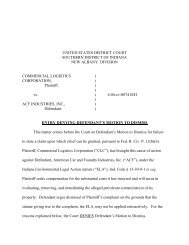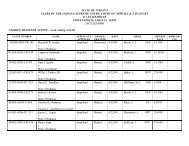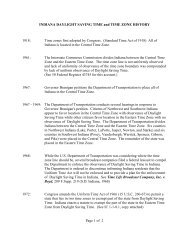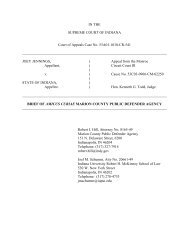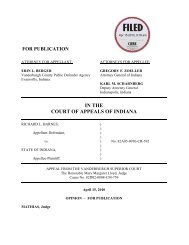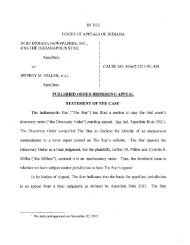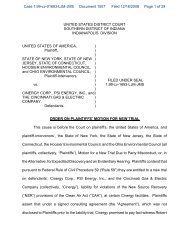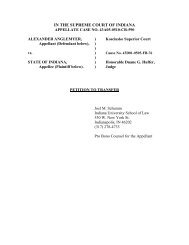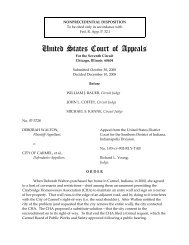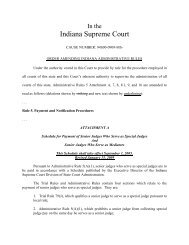this 3rd Circuit Petition - The Indiana Law Blog
this 3rd Circuit Petition - The Indiana Law Blog
this 3rd Circuit Petition - The Indiana Law Blog
You also want an ePaper? Increase the reach of your titles
YUMPU automatically turns print PDFs into web optimized ePapers that Google loves.
Case: 12-1582 Document: 003111182475 Page: 1 Date Filed: 03/01/2013<br />
UNITED STATES COURT OF APPEALS<br />
FOR THE THIRD CIRCUIT<br />
No: 12-1582<br />
In re: <strong>Indiana</strong>polis Downs, LLC, et al.,<br />
INDIANA DEPARTMENT OF REVENUE,<br />
Appellant<br />
v.<br />
INDIANAPOLIS DOWNS, LLC,<br />
Appellee<br />
v.<br />
HOOSIER PARK, L.P.<br />
Intervenor-Appellee<br />
Appeal from the United States Bankruptcy Court<br />
for the District of Delaware<br />
Chapter 11 Case No. 11-11046<br />
Bankruptcy Court: <strong>The</strong> Honorable Brendan L. Shannon<br />
Before: SLOVITER, NYGAARD, and JORDAN, <strong>Circuit</strong> Judges<br />
PETITION FOR CERTIFICATION OF QUESTION OF LAW<br />
1
Case: 12-1582 Document: 003111182475 Page: 2 Date Filed: 03/01/2013<br />
To the Honorable Justices of the <strong>Indiana</strong> Supreme Court:<br />
This matter came before the United States Court of Appeals for the Third <strong>Circuit</strong><br />
on direct appeal from an order entered by the United States Bankruptcy Court for the<br />
District of Delaware. Having reviewed the briefs and record of the case, the panel<br />
(Sloviter, Nygaard, Jordan, JJ.) has unanimously voted to petition for certification to the<br />
<strong>Indiana</strong> Supreme Court pursuant to Third <strong>Circuit</strong> L.A.R. Misc. 110 and Rule 64 of the<br />
<strong>Indiana</strong> Rules of Appellate Procedure. We believe that <strong>this</strong> case raises an important issue<br />
of <strong>Indiana</strong> law that is both determinative and novel. See Ind. R. App. P. 64 (providing for<br />
certification “when it appears to the federal court that a proceeding presents an issue of<br />
state law that is determinative of the case and on which there is no clear controlling<br />
<strong>Indiana</strong> precedent”). We respectfully request that the <strong>Indiana</strong> Supreme Court accept <strong>this</strong><br />
certification.<br />
<strong>The</strong> parties agree on the legal question at issue, and on the relevant facts:<br />
1. This case turns on the interpretation of two provisions of an <strong>Indiana</strong> statute, Ind.<br />
Code § 4-35-1-1 et seq. (“the Racino Statute”), which governs the operation of <strong>Indiana</strong><br />
racinos (casinos combined with horse-racing tracks). Section 4-35-7-12, the “set-aside”<br />
provision, requires racinos to set aside fifteen percent of their adjusted gross slot machine<br />
receipts to be distributed to various state-endorsed organizations and programs (“the setaside<br />
funds”). Section 4-35-8-1, the “Graduated Wagering Tax,” levies a tax on the<br />
adjusted gross receipts “received” by racinos. <strong>The</strong> issue of first impression raised by <strong>this</strong><br />
appeal is whether, for purposes of calculating the tax, the set-aside funds are included in<br />
“adjusted gross receipts received.”<br />
2
Case: 12-1582 Document: 003111182475 Page: 3 Date Filed: 03/01/2013<br />
2. <strong>The</strong> set-aside provision, Ind. Code § 4-35-7-12(b), provides, in pertinent part, that:<br />
a licensee shall before the fifteenth day of each month<br />
distribute an amount equal to fifteen percent (15%) of the<br />
adjusted gross receipts of the slot machine wagering from the<br />
previous month at the licensee's racetrack as provided in <strong>this</strong><br />
subsection.<br />
<strong>The</strong> Graduated Wagering Tax, Ind. Code § 4-35-8-1, provides, in pertinent part, that:<br />
(a) A graduated slot machine wagering tax is imposed as<br />
follows on one hundred percent (100%) of the adjusted gross<br />
receipts received before July 1, 2012, and on ninety-nine<br />
percent (99%) of the adjusted gross receipts received after<br />
June 30, 2012, from wagering on gambling games authorized<br />
by <strong>this</strong> article:<br />
(1) Twenty-five percent (25%) of the first one hundred<br />
million dollars ($100,000,000) of adjusted gross<br />
receipts received during the period beginning July 1 of<br />
each year and ending June 30 of the following year.<br />
(2) Thirty percent (30%) of the adjusted gross receipts<br />
in excess of one hundred million dollars<br />
($100,000,000) but not exceeding two hundred million<br />
dollars ($200,000,000) received during the period<br />
beginning July 1 of each year and ending June 30 of<br />
the following year.<br />
(3) Thirty-five percent (35%) of the adjusted gross<br />
receipts in excess of two hundred million dollars<br />
($200,000,000) received during the period beginning<br />
July 1 of each year and ending June 30 of the<br />
following year.<br />
(b) A licensee shall remit the tax imposed by <strong>this</strong> section to<br />
the department before the close of the business day following<br />
the day the wagers are made.<br />
3
Case: 12-1582 Document: 003111182475 Page: 4 Date Filed: 03/01/2013<br />
<strong>The</strong>re is no <strong>Indiana</strong> case law concerning either of these provisions.<br />
<strong>The</strong><br />
disposition of <strong>this</strong> case will settle <strong>this</strong> tax issue for <strong>Indiana</strong>’s racino industry because the<br />
entire industry, which consists of two racinos, is party to the lawsuit.<br />
3. <strong>The</strong> facts relevant to the question certified are as follows:<br />
(a)<br />
<strong>Indiana</strong>polis Downs, LLC (“<strong>Indiana</strong>polis Downs”) is the operator of an<br />
<strong>Indiana</strong> racino and a debtor in the process of Chapter 11 bankruptcy. Hoosier Park, LLP<br />
is also an operator of an <strong>Indiana</strong> racino and is present in <strong>this</strong> case as an intervenorappellee.<br />
<strong>The</strong>se two entities represent the entirety of the <strong>Indiana</strong> racino industry.<br />
(b)<br />
In November 2010, <strong>Indiana</strong>polis Downs filed a tax refund claim with the<br />
<strong>Indiana</strong> Department of Revenue (“IDOR”) seeking a refund for the taxes it had paid on<br />
the set-aside funds in fiscal years 2008, 2009, 2010 and part of 2011. IDOR denied the<br />
claim.<br />
(c)<br />
Subsequently, while in Chapter 11 proceedings, <strong>Indiana</strong>polis Downs filed a<br />
Motion for a Determination of the Legality of Certain Taxes, which challenged the<br />
application of the Graduated Wagering Tax to the set-aside funds. <strong>The</strong> motion did not<br />
seek a refund for taxes already paid. Rather, it sought a determination of whether the<br />
Graduated Wagering Tax must be paid on set-aside funds in the future. After hearing<br />
argument, the Bankruptcy Court entered its opinion on October 26, 2011, holding that the<br />
Graduated Wagering Tax did not apply to the set-aside funds. IDOR appealed the<br />
opinion to the District Court, and <strong>Indiana</strong>polis Downs initiated a direct appeal to <strong>this</strong><br />
court pursuant to 28 U.S.C. § 158 (d)(2). We agreed to hear the direct appeal.<br />
4
Case: 12-1582 Document: 003111182475 Page: 5 Date Filed: 03/01/2013<br />
(d)<br />
Meanwhile, <strong>Indiana</strong>polis Downs filed both an action in the <strong>Indiana</strong> Tax<br />
Court and a refund proceeding in the Bankruptcy Court to pursue a refund. <strong>Indiana</strong>polis<br />
Downs immediately informed the <strong>Indiana</strong> Tax Court of the related proceedings and<br />
requested a stay, which was granted. IDOR requested that the Tax Court vacate the stay,<br />
but it declined to do so. IDOR then challenged the stay in the <strong>Indiana</strong> Supreme Court.<br />
IDOR also petitioned for direct review of the merits of the tax dispute by the <strong>Indiana</strong><br />
Supreme Court. On June 20, 2012 the <strong>Indiana</strong> Supreme Court voted to affirm the stay<br />
and to deny IDOR’s petition for direct review.<br />
(e)<br />
In fiscal year 2012, <strong>Indiana</strong>polis Downs paid approximately $70 million in<br />
Graduated Wagering Tax and distributed approximately $37 million as required by Ind.<br />
Code § 4-35-7-12. In accordance with the Bankruptcy Court’s opinion, it did not pay tax<br />
on the $37 million in set-aside funds. <strong>Indiana</strong>polis Downs paid $10.6 million less in<br />
Graduated Wagering Tax than it would have if it were required to include the set-aside<br />
funds in its taxable adjusted gross receipts.<br />
4. IDOR argues to <strong>this</strong> court that the Graduated Wagering Tax is unambiguous and<br />
“adjusted gross receipts received” includes the set-aside funds. IDOR asserts that the<br />
term “received” is non-technical and, given its ordinary meaning, applies to any funds of<br />
which <strong>Indiana</strong>polis Downs takes possession. IDOR further contends that, in the context<br />
of the highly regulated racino industry, the state may tax the set-aside funds even if<br />
<strong>Indiana</strong>polis Downs has no beneficial interest in them. Lastly, IDOR argues that it is<br />
immaterial whether the Graduated Wagering Tax imposes double taxation because<br />
double taxation does not per se invalidate a taxation statute.<br />
5
Case: 12-1582 Document: 003111182475 Page: 6 Date Filed: 03/01/2013<br />
5. <strong>Indiana</strong>polis Downs argues that it never “receives” the set-aside funds for<br />
purposes of the Graduated Wagering Tax because it never receives the beneficial use of<br />
the funds. Rather, it is a mere conduit through which the funds flow to the entities<br />
designated by Ind. Code § 4-35-7-12. <strong>Indiana</strong>polis Downs contends that, under <strong>Indiana</strong><br />
law, it may not be taxed on funds that simply pass through it to others. <strong>Indiana</strong>polis<br />
Downs also argues that, by IDOR’s reading, the Racino Statute results in double taxation,<br />
which <strong>Indiana</strong> law disfavors.<br />
6. <strong>The</strong> Bankruptcy Court found the Racino Statute to be ambiguous. Turning to<br />
broader principles of <strong>Indiana</strong> law, the Court agreed with <strong>Indiana</strong>polis Downs that <strong>Indiana</strong><br />
common law generally prohibits taxing funds for which a party is a mere conduit, and<br />
also disfavors double taxation. <strong>The</strong> Bankruptcy Court reasoned that, in the absence of a<br />
clear statutory directive to the contrary, set-aside funds should not be deemed “received”<br />
for purposes of the Graduated Wagering Tax.<br />
7. This court has consistently refrained from certifying cases to state courts when we<br />
can confidently predict how the state court would decide the issue presented. See, e.g.,<br />
Travelers Indem. Co. v. DiBartolo, 171 F.3d 168, 169 n.1 (3d Cir. 1999) (declining to<br />
certify a question to the Pennsylvania Supreme Court in part because the issue was not<br />
sufficiently difficult). In <strong>this</strong> case, however, we cannot predict with confidence how the<br />
<strong>Indiana</strong> Supreme Court would decide <strong>this</strong> issue. <strong>The</strong>re are no decisions that we are aware<br />
of applying Ind. Code §§ 4-35-7-12 and 4-35-8-1.<br />
8. Furthermore, we believe that the question of law certified is of such substantial<br />
public importance in <strong>Indiana</strong> as to require prompt and definitive resolution by your<br />
6
Case: 12-1582 Document: 003111182475 Page: 7 Date Filed: 03/01/2013<br />
Honorable Court. <strong>The</strong> issue is significant both in terms of the amount in controversy and<br />
for future policy in the state. We have found certification to be “a useful vehicle . . . to<br />
give the state supreme courts an opportunity to elucidate an important issue of state law,<br />
thereby avoiding erroneous predictions that will confuse rather than clarify the issue.”<br />
Kendrick v. Dist. Attorney of Phila., 488 F.3d 217, 219 n.1 (3d Cir. 2007). While we are<br />
strangers to <strong>Indiana</strong> tax law and <strong>Indiana</strong>’s racino industry, the <strong>Indiana</strong> Supreme Court is<br />
the entity that can interpret the Racino Statute in the manner most consistent with<br />
<strong>Indiana</strong>’s law and policy. Because the Supreme Court of <strong>Indiana</strong> is uniquely qualified to<br />
decide <strong>this</strong> novel question of <strong>Indiana</strong> law, and because certification may “in the long run<br />
save time, energy, and resources and help[] build a cooperative judicial federalism,”<br />
Lehman Bros. v. Schein, 416 U.S. 386, 391 (1974), we think that certification is<br />
warranted.<br />
NOW, THEREFORE, the following question of law is certified to the <strong>Indiana</strong><br />
Supreme Court for disposition according to the rules of that Court:<br />
certification.<br />
Are the funds that racinos must distribute pursuant to Ind. Code § 4-35-7-12<br />
included in “adjusted gross receipts received” for purposes of the Graduated<br />
Wagering Tax, Ind. Code § 4-35-8-1?<br />
This court shall retain jurisdiction of the appeal pending the resolution of <strong>this</strong><br />
<strong>Circuit</strong> Judge<br />
/s/ Dolores K. Sloviter<br />
7
Case: 12-1582 Document: 003111182475 Page: 8 Date Filed: 03/01/2013<br />
Dated: March 1, 2013<br />
tmk/cc:<br />
Kevin D. Finger, Esq.<br />
Dennis A. Meloro, Esq.<br />
David A. Suess, Esq.<br />
Thomas D. Cameron, Esq.<br />
Jennifer E. Gauger, Esq.<br />
John D. Snethen, Esq.<br />
Andrew W. Swain, Esq.<br />
Jeffrey M. Schlerf, Esq.<br />
Michael C. Shepherd<br />
8



